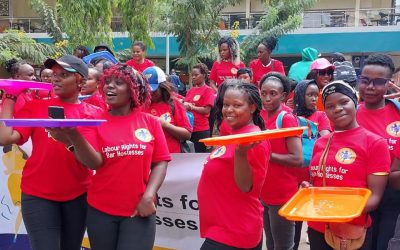Bar Hostess Empowerment and Support Programme (BHESP) is a sex worker-led organisation that includes sex workers, women who have sex with women (WSW), women who use drugs and bar hostesses in Kenya. Founded in 1998, the organisation serves as a common voice in efforts to reduce stigma and discrimination, while engaging various stakeholders in advocacy and policy dialogue. It is the first and oldest sex worker-led organisation in Kenya.
NSWP interviewed BHESP’s Executive Director Peninah Mwangi and one of BHESP’s Project Officer’s Kayte Njoki.
How was the Bar Hostess Empowerment and Support Programme founded?
Bar Hostess Empowerment and Support Programme was founded at a time when sex workers were experiencing a lot of police violence and violence from clients. Some sex workers had been murdered, and the police were not doing anything to address the violence. “Many of us were doing sex work in the bars. The police knew we worked in the bars and clients were often with us at the bars, so they harassed us and often beat up the girls. When sex workers were shot we felt we had to come together to do something to help ourselves,” said Peninah Mwangi.
HIV was also very high in the bars at the time. According to Peninah, 80 percent of sex workers in the bars were living with HIV. “We lost the bar owners, clients, and sex workers as well. There was no medication and no HIV testing. We were really on own. It was a really sad time for us in the mid-90s. The government and the World Health Organization had not thought of looking at those most affected by the virus,” said Peninah.
In 1998-1999, the government called HIV a national disaster. However, most of the programmes offered in the country were funded by the United States and focused on abstinence as a form of prevention. “We were seen as the face of HIV,” said Peninah. “At the time, sex workers were arrested under the Public Health Act. Sex workers were taken to medical facilities and tested for HIV. If they tested positive, they were detained and forced to take medication. This was very normal at the time,” she continued.
Bar Hostess Empowerment and Support Programme eventually received funding. Not as sex workers, but as vulnerable women working in bars. “In the mid-90s, many of us were superstitious and did not know anything about HIV. We believed in witchcraft and believed that if you put certain things in our private parts it would protect us from HIV. We met with women who were HIV positive who told us ‘what was up’. They told us it is possible to live with the disease, work, and live a long life,” said Peninah.
Bar Hostess Empowerment and Support Programme was first funded and supported by the Kenyan Breweries because bar hostesses (sex workers in the bars) increased alcohol sales. 90 percent of the beer in the bars was sold by bar hostesses, so it was in the economic interest of the Kenyan Breweries to make sure sex workers were able to stay in the bars, free from violence and harassment. Bar Hostess organised a meeting with representatives from 7 major regions in the country.
“Over the years the breweries have distanced themselves from us because we have become more political and demand the decriminalisation of sex work,” said Peninah.
What is the history of the organisation?
“We got support from the National AIDS Council and eventually from the Global Fund. With this funding we were able to spread and now we offer services in Nairobi and 5 regions close to the capital. We even bought bicycles to do outreach at one point! It was a very exciting time. We built strong alliances with the feminist movement, too. We really spread our wings,” said Peninah.
It was not until the Open Society Foundation (OSF) came into Kenya in 2008-2009 that BHESP was supported in its advocacy work. They conducted a research study called “Documenting Human Rights Violations of Sex Workers in Kenya: a Study Conducted in Nairobi, Kisumu, Busia, Nanyuki, Mombasa, and Malinda” in collaboration with FIDA, the Federation of Women Lawyers in Kenya. “We wanted to mobilise sex workers to fight back against violence,” said Peninah.
Once the research was complete, OSF funded BHESP to respond to violence in the country.
What are the priority areas that BHESP works in? Does BHESP provide services to sex workers?
BHESP has over 20 staff members. At least 50 percent of the staff are current or former sex workers. While Bar Hostess has some volunteer positions, most positions within the organisation are paid positions.
Bar Hostess Empowerment & Support Programme provides the following services:
Paralegal services
Lawyers from the Centre for Rights Education and Awareness (CREAW) trained sex workers as paralegals in collaboration with BHESP. They provide legal services to sex workers and accompany sex workers to court when they plead not guilty to various sex work related offences, such as loitering.
“When I first started working for Bar Hostess Empowerment and Support Programme, I was trained as a paralegal through CREAW,” said Kayte Njoki, a sex worker and Project Officer with Bar Hostess. “Eventually I became a Project Officer,” she continued.
According to CREAW’s website, CREAW “is working to reduce harassment and discrimination against commercial sex workers. We work directly with sex workers to educate them on how human rights laws as well as Kenyan laws apply to them and support them to mobilize and act on issues of concern, aiming to create a more productive and less antagonistic relationship between themselves and both police and city council officials. To date, CREAW’s assistance has seen 35 sex workers acquitted of unfairly leveled charges.”
Health services
BHESP runs a health clinic by and for sex workers. The government funds the clinic.
“The governmental took a turn and started targeting those who were most affected by the disease. Through studies it was shown that clinics run by the community provide services in a non-stigmatising way. We do not just offer biomedical services. Sex workers come here to hang out, watch television, do their hair, and wait for clients. We provide ARVs to sex workers and work with clinicians. We work with government doctors who supervise and give us guidance,” said Peninah.
BHESP also trains sex workers to provide voluntary counseling and testing (VCT) for HIV. They also train sex workers as peer educators in the clinics. “Peer education is the cornerstone of Bar Hostess,” said Peninah.
“I work a lot in the Hot Spots [areas with a lot of sex work],” said Kayte. “Outreach workers tell Bar Hostess what is needed on the ground. We provide sex workers with our number and if a sex worker is arrested, they know they can call us and we find someone to go to court with them. Most of us are not empowered. We are not educated and we have no money. Bar Hostess Empowerment and Support Programme helps the girls,” Kayte continued.
Bar Hostess brings services to sex workers in the field. “We provide STI testing and counselling, peer education, legal services, advocacy services. We take all of our services to the hot spots and bring everything sex workers might need,” said Kayte.
Advocacy services
Bar Hostess also participates in policy development at the national level. For example, they participated in the initial strategic plan of the AIDS National Council in 2010-2012. BHESP wanted to make sure they had a very strong understanding of the issues facing sex workers and other key populations in Kenya. “We made sure we were in the strategic plan right from the beginning,” said Peninah.
“Sex work is not legal in Kenya. Police always harass us and beat us up. They take us to the court. We are keeping their environment dirty. We have so many challenges,” said Kayte, “so at Bar Hostess we do a lot of advocacy work to change the situation for sex workers in Kenya,” she continued.
What were the biggest events or challenges Bar Hostess Empowerment and Support Programme has worked on in the past?
“One of our biggest challenges was and continues to be the law in Kenya. We worked with a women’s organisation called CREAW. We partnered with them and trained sex workers as paralegals. We were the first organisation in the whole of Africa to train sex workers as paralegals. We thought that being a prostitute was a crime in Kenya, but it is not. The police would strip search us and we would not argue against them. ‘He caught me in the bar so I am guilty,’ we used to think. We did not know the exact crime or what was written in the law. We did not know our rights. We used to make it very easy for the police because we always admitted we were guilty,” said Peninah.
To address this issue, BHESP with CREAW trained paralegals to advocate for sex workers when they are arrested. According to research by the Open Society Foundations, Bar Hostess “identified 18 peer educators who had demonstrated leadership and partnered with CREAW to train them on laws related to sex work, police arrest procedures, and guidelines for responding to and collective evidence of abuse. The paralegals are always on call, serving as the first point of contact for sex workers who need legal help”. Since 2010, sex workers have successfully challenged loitering charges and other municipal charges more than 60 times because the police failed to provide evidence of the offence.
Another big challenge experienced by sex workers in Kenya was the serial murderer in Thika who was targeting sex workers in 2010. “When I first heard of Bar Hostess Empowerment and Support Programme, two of my truest friends had been murdered by this serial killer in Thika. I was also working as a sex worker there, and very scared for my own life,” said Kayte.
“People began to talk about a dark man, who was drinking the blood of sex workers. Some girls were found dead in the lodging [places where sex workers lived and worked], but eventually the lodging owners began dumping the bodies outside to avoid an internal investigation,” said Peninah.
“Bar Hostess members decided to lead a demonstration and 17 girls were arrested by the police who were denying there was a serial murderer,” said Peninah. “I was not arrested, but I did participate in the protest in Thika,” said Kayte, “Bar Hostess came to save us,” she continued.
“The sex workers were charged with lying to police officers in uniform. We did not even know there was such an offence. It was a horrifying time and we did a lot of advocacy. We even appeared on the television to speak about it,” said Peninah. It was at this time that Bar Hostess Empowerment and Support Programme began working with CREAW. CREAW lawyers represented the sex workers who were detained during the demonstrations.
After months of advocacy work from BHESP, the police could no longer deny the existence of the serial murderer and Philip Onyancha was arrested, charged, and found guilty of murdering 17 sex workers, including two of Kayte’s friends.
Another challenge faced by sex workers in Kenya is when the police are accused of murdering sex workers. Bar Hostess Empowerment and Support Programme demand the police oversight committee address police violence against sex workers. “We have two cases that are with the police oversight committee. Who do you report to in these instances? We have been able to take the matter to the oversight committee. In one case the police officer was arrested and is still in custody. We made a lot of noise and called the media and the commandment of the police was forced to arrest the man,” said Peninah.
What are some of the most important successes of Bar Hostess Empowerment and Support Programme?
In the past, 90 percent of sex workers in Nairobi were charged with loitering. Less than 10 percent of those cases ended up in court. The police officers who charged these sex workers would demand an illegal payment from sex workers to let them go. “It was a form of bribery,” said Peninah.
Now, everytime a sex worker is charged with loitering BHESP encourages sex workers to plead “Not Guilty” in front of the judge and make the police officer prove and show evidence that the person in question was loitering or breaking the law.
“How do you prove that she was loitering? The police officer would say to the judge ‘oh, she was standing at the bus station at 3 am’ and the judge replied ‘that doesn’t mean anything, there is Freedom of Movement in Kenya. She can stand wherever she wants at any time she wants.’ Then the police would say ‘oh, but she was wearing a short skirt’ and the judge would reply ‘that doesn’t mean anything, there is Freedom of Expression in Kenya. She can wear whatever she wants wherever she wants,’,” said Peninah.
“Finally, the police officer said ‘I asked her how much, and she said 200 shillings’ and the judge said the evidence was not admissible because it is entrapment,” finished Peninah.
This was the first of many cases won by the Bar Hostess Empowerment & Support Programme.
What will be the biggest challenges for BHESP in the future?
“We hope to use the cases before the courts to challenge the constitutionality of the laws,” said Peninah. Bar Hostess Empowerment and Support Programme is fighting for the decriminalisation of sex work in Kenya. In addition to fighting the laws, Peninah Mwangi told NSWP that sex workers in Kenya continue to face violence and this will be an ongoing challenge for the organisation.
Does Bar Hostess Empowerment and Support Programme have a message for the sex worker rights movement? What about for people outside of the movement?
“Sex workers should be respected and their rights should be upheld. Sex workers are amazing,” said Peninah.
Both Peninah and Kayte want people to understand that sex work is work. Both said that sex workers are “your sisters, mothers, aunties, uncles, fathers.”
“I raise my children through sex work. I am a good mother because I am a sex worker,” said Kayte. “If sex work was decriminalised I would pay my taxes like everyone else,” concluded Kayte.
http://www.nswp.org/featured/bar-hostess-empowerment-and-support-programme




